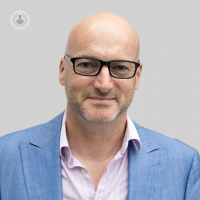Heart rhythm monitoring - How are abnormal rhythms detected?
Written in association with:An abnormal heart rhythm, known medically as an arrhythmia, is a condition where the heart beats too fast, too slowly, or in an irregular pattern. Our heart rhythm is usually controlled by electrical signals that coordinate the pumping action of the heart, ensuring blood is distributed efficiently around the body. However, when these signals are disrupted, arrhythmias can occur, potentially leading to symptoms and complications.
Renowned consultant cardiologist Dr Martin Lowe helps you understand more about abnormal heart rhythms, the different types, causes, and when to seek medical attention.

What are the various types of arrhythmias?
There are several types of arrhythmias, each with different effects on heart rate and function:
Tachycardia: This refers to a heart rate that is too fast, generally over 100 beats per minute (bpm). It may give you the sensation that your heart is beating rapidly.
Bradycardia: This is when the heart beats too slowly, typically less than 60 bpm, which can result in dizziness or fatigue.
Atrial fibrillation: One of the most common types of irregular heartbeat, atrial fibrillation causes the upper chambers of the heart (the atria) to quiver instead of beating properly. This can lead to blood clots, stroke, and heart failure if left untreated.
Premature beats: These are extra heartbeats that occur earlier than normal in the heart's rhythm. While often harmless, frequent premature beats may indicate underlying issues.
What are the primary causes of abnormal heart rhythms?
Arrhythmias can be caused by various factors, including underlying medical conditions or lifestyle habits. Common causes include:
Heart disease: Conditions like coronary artery disease, heart attacks, or heart failure can damage the heart’s electrical system, leading to arrhythmias.
Electrolyte imbalance: Electrolytes such as potassium, sodium, and calcium help control the electrical impulses in the heart. An imbalance in these minerals can interfere with the heart's normal rhythm.
High blood pressure: Over time, high blood pressure can damage the heart, increasing the risk of arrhythmias.
Lifestyle factors: Excessive alcohol consumption, caffeine, stress, or smoking can all trigger abnormal heart rhythms.
What are the symptoms to watch for?
Not all arrhythmias cause noticeable symptoms, but when they do, they can include:
- A sensation of your heart pounding or beating rapidly.
- Dizziness or light-headedness.
- Chest pain or discomfort.
- Fainting (syncope).
If you experience any of these symptoms, especially chest pain or fainting, it is essential to seek medical advice promptly, as some arrhythmias can be life-threatening if not managed properly.
How are arrhythmias diagnosed and treated?
Diagnosing an arrhythmia usually involves tests like an electrocardiogram (ECG), which records the electrical activity of the heart, or Holter monitoring, where your heart is monitored for an extended period. Depending on the type and severity of the arrhythmia, treatments can vary from lifestyle modifications and medications to more invasive options such as cardioversion (a procedure to restore a normal rhythm) or an implantable cardioverter-defibrillator (ICD), a small device that helps regulate heartbeats.
Additionally, ablation can be used as a curative keyhole procedure to block electrical conduction in an extra pathway or irritable focus inside the heart.
Recognising abnormal heart rhythms and understanding when to seek help can protect you from more serious complications. Always consult a cardiologist if you have concerns about your heart health.
If you are concerned about arrhythmias and would like to book a consultation with Dr Lowe, simply visit his Top Doctors profile today.


